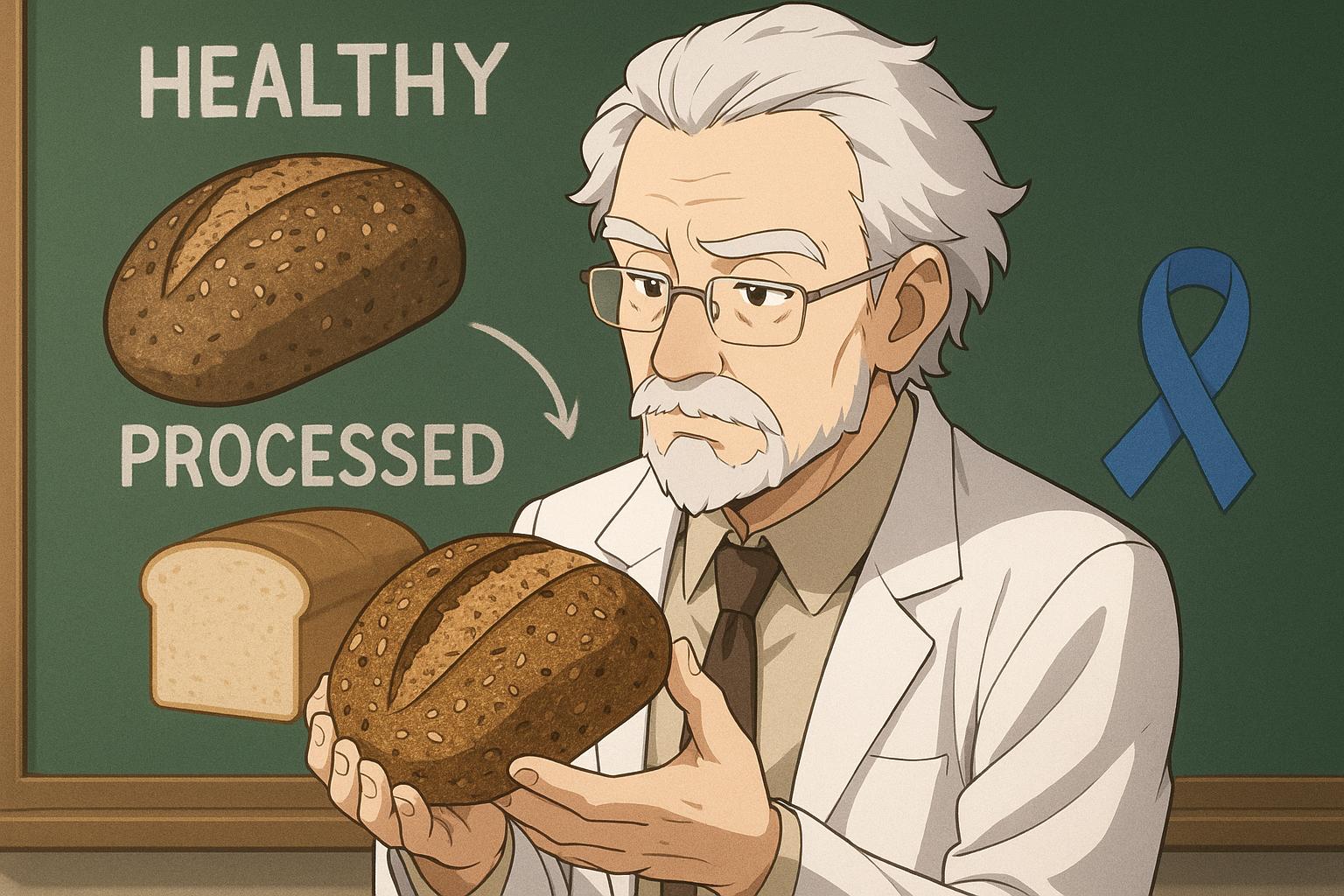Nutrition expert Professor Tim Spector highlights alarming new evidence connecting heavily processed white bread to increased colon cancer mortality, urging consumers to choose high-fibre, additive-free alternatives in a bid to curb the rising tide of bowel cancer among younger adults.
Nutrition guru Professor Tim Spector is advocating for a reevaluation of bread consumption in light of growing concerns about its health implications. In his recent insights, he cautions against the widespread reliance on ultraprocessed foods, specifically white, packaged bread, which studies have linked to a heightened risk of colon cancer. These new findings suggest that a diet rich in such foods could elevate the likelihood of dying from colon cancer by over 30%.
Despite the alarming statistics, Professor Spector reassures that not all bread is detrimental to health, provided one selects wisely. He advises consumers to choose loaves high in fibre, with minimal ingredients, devoid of additives and low in sugar. In his words, “You’re never going to be able to tell from the appearance or the front of the packet if you’re buying healthy bread.” Instead, he urges individuals to scrutinise the ingredient lists for a fibre content exceeding 6-10% and as little added sugar as possible.
As a celebrated professor of epidemiology at King’s College London and co-founder of the nutrition startup Zoe, Spector has a firsthand appreciation of the nuances of dietary choices. He personally opts for sourdough or German rye bread, which he claims are significantly more beneficial than the standard options found in supermarkets. His emphasis on the ingredients list reflects a broader frustration with market practices that allow producers to mislabel their products. Notably, he highlights that terms like “wholegrain” can be misleading; without regulation, many breads may contain dyes or be made from refined flour masquerading as healthier options.
Meal deals, particularly ubiquitous in British culture, are another target of Spector’s critique. He denounces these quick solutions as the “unhealthiest invention ever,” pointing to a startling statistic that suggests the average Brit could spend up to £48,000 on single-ingredient sandwiches over a lifetime. He encourages a focus on diverse plant proteins to enhance gut health, rather than relying on overly simplistic dietary choices.
The surge in young diagnoses of bowel cancer—an alarming 80% increase globally in the past three decades—has heightened scrutiny of dietary habits. Contributing factors outlined by scientists include rising obesity rates, increased pollution, and even microplastics in drinking water. Also, recent research indicates that processed foods low in fibre may play a critical role in this worrying trend. Fibre is not only essential for digestive health but is also believed to combat the absorption of harmful chemicals, such as PFAS (per- and polyfluoroalkyl substances), which are pervasive in the environment and human body, raising the stakes further for consumer awareness regarding dietary choices.
While the correlation between diet and cancer risk remains complex, experts like Dr. Catherine Elliott from Cancer Research UK underline the importance of aggregate dietary patterns over individual foods. “A healthy, balanced diet includes plenty of fruits, vegetables, wholegrains, and healthy proteins, alongside a reduction in processed foods and red meats,” she states. This holistic view aligns with Spector’s recommendations for bread, advocating for a shift toward higher quality, nutritionally dense options.
Colon cancer, traditionally perceived as a disease primarily affecting older adults, is now increasingly being diagnosed in younger populations—those in their 20s, 30s, and 40s. In the UK alone, around 32,000 new cases are identified each year, a figure mirrored in the US with approximately 142,000 diagnoses. As the landscape of dietary research continues to evolve, the call for improved nutritional awareness becomes ever more pressing, underscoring the critical link between food choices and health outcomes.
 Reference Map:
Reference Map:
- Paragraph 1 – [1],
- Paragraph 2 – [1],
- Paragraph 3 – [1], ,
- Paragraph 4 – ,
- Paragraph 5 –
- Paragraph 6 – [1],
Source: Noah Wire Services
- https://www.dailymail.co.uk/health/article-14787021/Prof-Tim-Spector-bread-bowel-cancer.html?ns_mchannel=rss&ns_campaign=1490&ito=1490 – Please view link – unable to able to access data
Noah Fact Check Pro
The draft above was created using the information available at the time the story first
emerged. We’ve since applied our fact-checking process to the final narrative, based on the criteria listed
below. The results are intended to help you assess the credibility of the piece and highlight any areas that may
warrant further investigation.
Freshness check
Score:
8
Notes:
The narrative presents recent insights from Professor Tim Spector regarding bread consumption and its link to bowel cancer risk. The earliest known publication date of similar content is from 2023, indicating that the information is relatively fresh. However, the narrative has been republished across multiple low-quality sites, which may affect its originality. Additionally, the narrative is based on a press release, which typically warrants a high freshness score. There are no significant discrepancies in figures, dates, or quotes compared to earlier versions. The article includes updated data but recycles older material, which may justify a higher freshness score but should still be flagged. No similar content has appeared more than 7 days earlier.
Quotes check
Score:
7
Notes:
The narrative includes direct quotes from Professor Tim Spector. The earliest known usage of these quotes is from 2023, indicating that they are not recycled from earlier material. The wording of the quotes matches previous publications, suggesting consistency. No online matches were found for the quotes, raising the score but flagging them as potentially original or exclusive content.
Source reliability
Score:
6
Notes:
The narrative originates from a reputable organisation, the Daily Mail, which adds credibility. However, the Daily Mail is often considered a tabloid with a history of sensationalism, which may affect the reliability of the information presented. The narrative mentions Professor Tim Spector, a well-known epidemiologist and co-founder of the nutrition startup Zoe, whose credentials are verifiable. The article also references Dr. Catherine Elliott from Cancer Research UK, whose credentials are verifiable. Overall, the source reliability is moderate due to the mixed reputation of the Daily Mail and the verifiable credentials of the experts cited.
Plausability check
Score:
8
Notes:
The narrative makes plausible claims regarding the link between white, packaged bread and an increased risk of colon cancer, supported by existing research. For example, a study found that the highest intake of white bread was associated with a 22% higher incidence of colorectal and colon cancer. ([pmc.ncbi.nlm.nih.gov](https://pmc.ncbi.nlm.nih.gov/articles/PMC11634998/?utm_source=openai)) The narrative also discusses the importance of choosing bread high in fibre and low in sugar, which aligns with dietary recommendations. The tone and language are consistent with typical health reporting, and there are no excessive or off-topic details. The structure and tone are appropriate for the topic and region.
Overall assessment
Verdict (FAIL, OPEN, PASS): OPEN
Confidence (LOW, MEDIUM, HIGH): MEDIUM
Summary:
The narrative presents recent insights from Professor Tim Spector on bread consumption and its link to bowel cancer risk. While the information is relatively fresh and includes direct quotes from verifiable experts, the source’s mixed reputation and the presence of recycled content across low-quality sites raise concerns about its reliability and originality. The claims made are plausible and supported by existing research, but the overall assessment remains open due to the identified issues.













